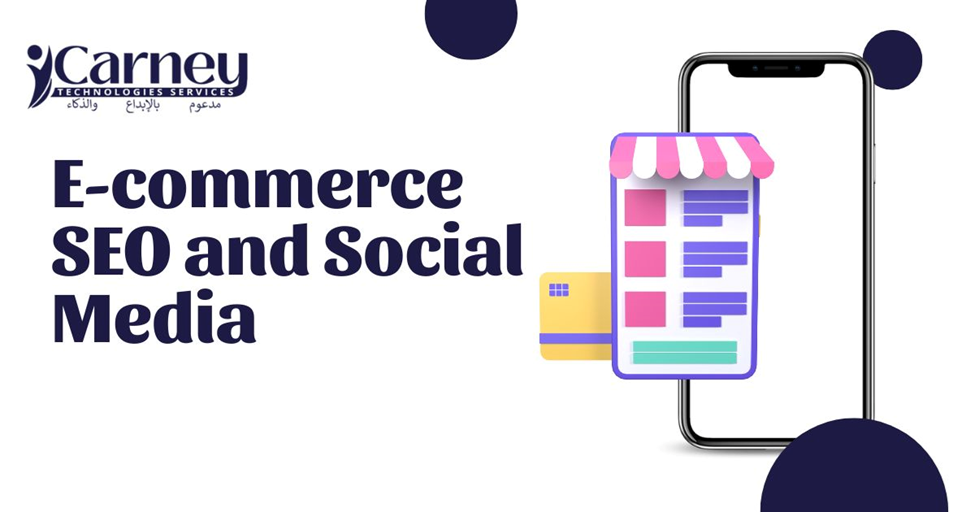E-commerce success hinges on a delicate balance between search engine optimization (SEO) and social media strategies. This comprehensive guide explores how businesses can leverage both e-commerce seo and social media strategy to drive traffic, increase conversions, and boost overall online presence. We’ll delve into expert tips, best practices, and innovative approaches to help your e-commerce venture thrive in the competitive digital marketplace.

Understanding the Symbiosis of E-commerce SEO and Social Media
Understanding how e-commerce SEO and social media work together is like seeing two sides of the same coin. SEO is all about making your online store easier to find through search engines, while social media is where you engage with your audience and build brand loyalty. When these two strategies align, you create a powerful synergy. Good SEO ensures your products and content show up in relevant searches, while a strong social media presence drives traffic and enhances brand visibility. Together, they boost your online presence, attract more customers, and ultimately, drive sales. It’s all about using each tool to amplify the other for a more robust online strategy.
The Interconnected World of Online Visibility
In the realm of e-commerce, SEO and social media are not isolated entities but rather interconnected components of a successful digital strategy. While e-commerce SEO focuses on optimizing your website for search engines, social media provides a platform for brand engagement and customer interaction. By synergizing these two approaches, businesses can create a powerful online presence that drives traffic and conversions.

Leveraging Social Signals for Enhanced SEO Performance
Social signals, such as likes, shares, and comments, play a crucial role in boosting your website’s search engine rankings. When your content gains traction on social media platforms, it sends positive signals to search engines, indicating that your website offers valuable information. This, in turn, can lead to improved visibility in search results and increased organic traffic to your e-commerce site.
Crafting an Effective E-commerce SEO Strategy
Unlock the full potential of your online store by crafting a killer e-commerce SEO strategy. Dive into smart keyword choices and engaging content to stand out and boost your sales.
Optimizing Your Online Store for Search Engines
To excel in e-commerce SEO, focus on these key areas:
- Keyword Research:Discover pertinent, high-traffic keywords for your products and industry.
- On-Page Optimization: Optimize product titles, descriptions, and meta tags with target keywords.
- Site Structure: Create a logical, easy-to-navigate website structure for both users and search engines.
- Content Marketing: Develop informative, engaging content that addresses customer pain points and showcases your expertise.
Leveraging Long-Tail Keywords for Niche Markets
Long-tail keywords, such as “Shopify development services Dubai,” can help you target specific audience segments and improve your chances of ranking for less competitive terms. Incorporate these keywords naturally into your product descriptions, blog posts, and landing pages to attract highly qualified traffic.
Developing a Robust Social Media Strategy
Crafting a strong social media strategy is like building a solid foundation for your online presence. It’s all about knowing your audience, setting clear goals, and engaging consistently to make your brand stand out in the digital crowd.
Building Brand Awareness and Customer Engagement
An effective social media strategy for e-commerce involves:
- Platform Selection: Select social media mastery that matches the demographics of your target audience.
- Content Creation: Develop visually appealing, shareable content that showcases your products on YouTube and brand personality.
- Community Building: Engage with followers, respond to comments, and foster a sense of community around your brand.
- Influencer Partnerships: Opt for social media platforms that align with the demographics of your target audience.
Leveraging Social Media Marketing Agency in Dubai for Local Reach
For businesses targeting the Dubai market, partnering with a local social media marketing agency can provide valuable insights into regional trends and consumer behavior. These agencies can customize your social media strategy to connect with local audiences and boost traffic to your e-commerce store.
Combining SEO and Social Media for Optimal Results
When you blend SEO with social media, you’re not just boosting your online presence—you’re creating a powerful synergy that drives real, measurable results. It’s like giving your digital strategy a turbo boost, making sure your content gets seen and shared across the board.

Creating a Cohesive Digital Marketing Ecosystem
To maximize the synergy between e-commerce SEO and social media:
- Cross-Promote Content: Share your optimized blog posts and product pages on social media platforms to drive traffic and engagement.
- Implement Social Share Buttons: Make it easy for visitors to share your content on social media, increasing visibility and potential backlinks.
- Optimize Social Profiles: Use relevant keywords in your social media profiles and descriptions to improve discoverability.
- Monitor and Analyze: Consistently monitor your SEO and social media performance to pinpoint areas for enhancement and leverage successful strategies.
Measuring Success and Adapting Strategies
When it comes to measuring success and adapting strategies, it’s all about staying flexible and tuned in to what works. Keep an eye on your goals, tweak your approach as needed, and celebrate those wins along the way!

Key Metrics for E-commerce SEO and Social Media Strategy
To gauge the effectiveness of your integrated approach, monitor these metrics:
- Organic Traffic: Track the volume and quality of traffic from search engines.
- Social Media Engagement: Measure likes, shares, comments, and click-throughs from social platforms.
- Conversion Rates: Analyze how visitors from different channels convert into customers.
- Return on Investment (ROI): Calculate the overall return on your SEO and social media efforts.
Regularly review these metrics and adjust your strategies accordingly to ensure continued growth and success in the e-commerce landscape.
Conclusion
Mastering e-commerce requires a delicate balance between SEO and social media strategies. By integrating these two powerful digital marketing approaches, businesses can create a robust online presence that drives traffic, engages customers, and boosts conversions. At Carney Technologies, we understand the complexities of the digital marketplace and offer comprehensive solutions to help your e-commerce venture thrive. Visit https://carneytechnologies.ae/ to learn how we can elevate your online business to new heights. Don’t just survive in the digital world – thrive with Carney Technologies by your side!
FAQs
What is the timeframe for seeing results from e-commerce SEO efforts?
SEO is a long-term strategy, and results typically become noticeable within 3-6 months. However, significant improvements may take 6-12 months or longer, depending on various factors such as competition and industry.
Can social media directly impact my website's search engine rankings?
While social media activity doesn’t directly influence rankings, it can indirectly boost SEO by increasing brand awareness, driving traffic, and potentially earning backlinks from shared content.
How frequently should I post on social media for my e-commerce business?
The ideal posting frequency varies by platform and audience. Generally, aim for 1-2 posts per day on platforms like Facebook and Instagram, and 3-5 posts per day on Twitter. Consistency is key, so choose a schedule you can maintain.
What are some common e-commerce SEO mistakes to avoid?
Common mistakes include neglecting product descriptions, using duplicate content, having a poor site structure, and overlooking mobile optimization. Resolve these issues to enhance your e-commerce SEO performance.
What methods can I use to measure the ROI of my social media marketing efforts?
Track metrics such as conversions, click-through rates, and engagement rates. Use UTM parameters to track traffic from social media to your website and implement conversion tracking to measure sales generated from social channels.
Is it necessary to hire a social media marketing agency for my e-commerce business?
While not essential, a social media marketing agency can provide expertise, save time, and help develop targeted strategies. Consider your budget, goals, and in-house capabilities when deciding whether to partner with an agency.





